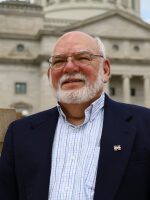From the Arkansas Advocate:
A divided Arkansas Supreme Court said Thursday that two state laws related to ballot petitions violate the constitution, in a case involving a paper-ballot measure from Cleburne County.
In the 4-3 decision, Justice Shawn Womack, writing for the majority, said a circuit judge erred in ordering County Clerk Rachelle Evans to certify an initiative petition for voters to consider because the petition was untimely filed under Article 5, Section 1 of the Arkansas Constitution. The Supreme Court opinion reversed and dismissed the lower court’s order.
In deciding the case, the Supreme Court majority declared unconstitutional two state laws governing the time frame during which county-level ballot measures can be filed because they conflict with the filing window established in Article 5, Section 1. That section says initiative petitions in cities and counties must be filed no earlier than 90 days and no later than 60 days before an election.
Declaring the laws unconstitutional meant that the justices also overruled three previous state high court decisions.
In a dissenting opinion Justice Rhonda Wood wrote that the majority raised legal issues not present in the original appeal or the circuit court record and “leaps over settled law to reach its decision.”

Case background
The case stems from the Cleburne County clerk’s rejection last year of a ballot initiative asking voters to approve an ordinance requiring elections be held using hand-marked, hand-counted paper ballots.
A group called Arkansas Voter Integrity Initiative has pushed for a switch from electronic voting machines to paper ballots in several counties since at least 2022. In 2023, Cleburne County Quorum Court approved a resolution to convert to paper ballots but later reversed itself. Searcy County is the only county so far to require hand-counted paper ballots.

Last year, identical petitions calling for countywide votes on switching to paper ballots were filed in nine counties, including Cleburne. Clerks of those counties rejected the ballot initiatives, and attorney Clinton Lancaster sued on behalf of supporters over the rejections.
Circuit judges dismissed the lawsuits in Conway, Johnson, Perry, Saline, Sharp, White and Van Buren counties, but judges in Cleburne and Independence counties ordered those clerks to certify the initiative petitions for placement on the November 2024 ballot. Those clerks appealed to the Arkansas Supreme Court.
The Independence County clerk asked for an expedited hearing, and on Oct. 17, 2024, the high court affirmed the circuit court order directing the clerk to certify the measure as sufficient. The initiative appeared on the November ballot, and voters approved the ordinance 8,309 to 5,184.
Cleburne County Clerk Rachelle Evans did not ask for an expedited hearing on her appeal. The Supreme Court began requesting briefs from the parties last November. After hearing oral arguments in May, the justices asked for supplemental briefs focused on the issue of timeliness.
‘Clear and unmistakable conflict’
Arkansas Code Annotated 14-14-915(b)(1) says all petitions for initiated county measures “shall be filed with the county clerk” not less than 90 days nor more than 120 days prior to the next regular election. That timeline is in “clear and unmistakable conflict” with Article 5, Section 1 and is therefore unconstitutional, Womack wrote.
Similarly ACA 14-14-915(b)(3) is unconstitutional, the justice wrote, because it allows a ballot initiative that is certified by county election commissioners less than 70 days before a general election to be held over for a vote at the next general election. In the Cleburne County case, this would have meant the petition being on the 2026 ballot.
“Put simply, when the proponent of a local ballot initiative fails to timely file his petition, a circuit court cannot require a county clerk to certify the initiative for that election,” Womack wrote. “Nor can the circuit court ‘delay’ the certification ‘until the following regular election’ if the initiative has not been filed” within the constitution’s timeline.
“Because of this, we expressly overrule Armstrong v. Sturch, Fine v. City of Van Buren,and Robie v. Bolton, all of which misinterpreted a nearly identical but now-repealed constitutional provision,” the ruling states.
Womack was joined in the majority opinion by Justices Cody Hiland, Barbara Webb and Nicholas Bronni.
Wood’s dissenting opinion, concurred in by Justice Courtney Rae Hudson and Chief Justice Karen Baker, says the majority’s conclusion on the constitutionality of the two laws and the timeliness of the ballot initiative filing “rests on its own factual finding” that the petition had to be filed on or before Aug. 5, 2024 “— an assertion on which the record is silent.”
Citing the late U.S. Supreme Court Justice Antonin Scalia’s position that appellate courts are arbiters of legal questions, not “self-directed boards of legal inquiry,” Wood wrote that the majority “departs from neutrally arbitrating the issues argued by the parties and instead becomes investigator and inquisitor.”
In rebuttal, Womack wrote: “The dissent does not claim that the record does not support our holding. Instead, the dissent laments the fact that we noticed obvious problems with the underlying petition.” The record clearly indicates that initiative supporter Raymond Harrison failed to timely file the petition, the majority noted. To ignore “such a glaring constitutional violation…would be a dereliction of our duty.”
The dissenting opinion also takes issue with the high court’s failure to alert the attorney general and the Legislature to the constitutional issues of the case.



